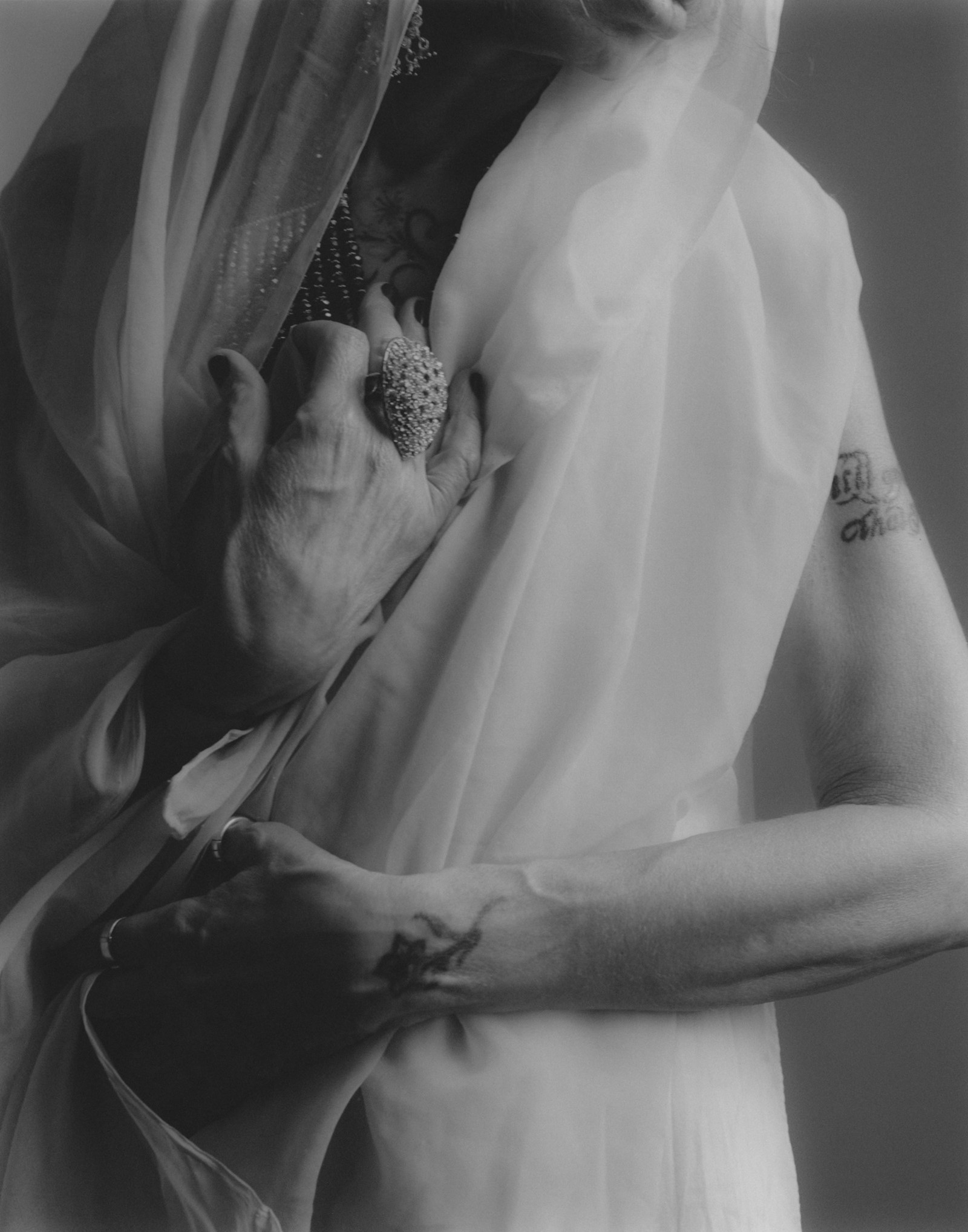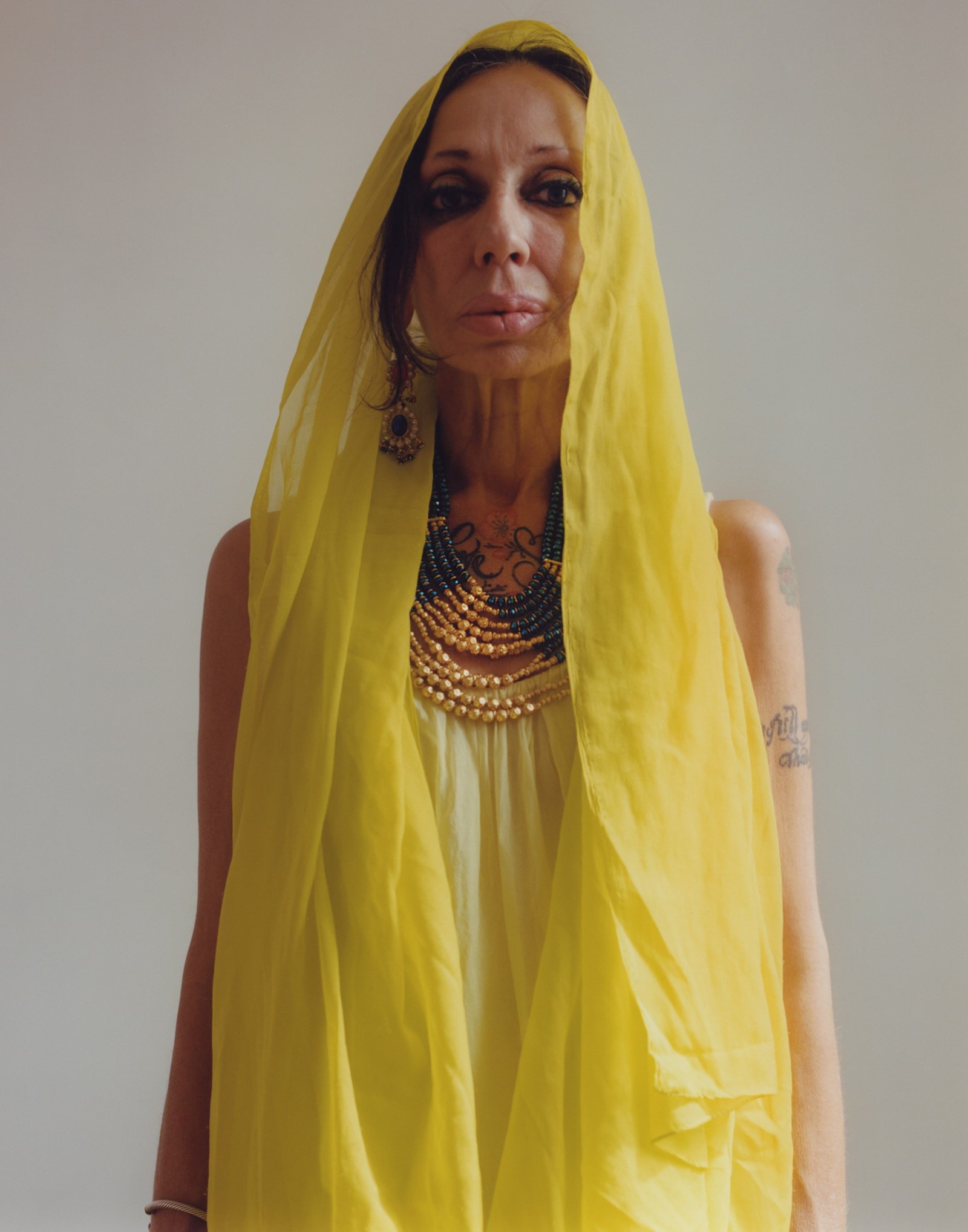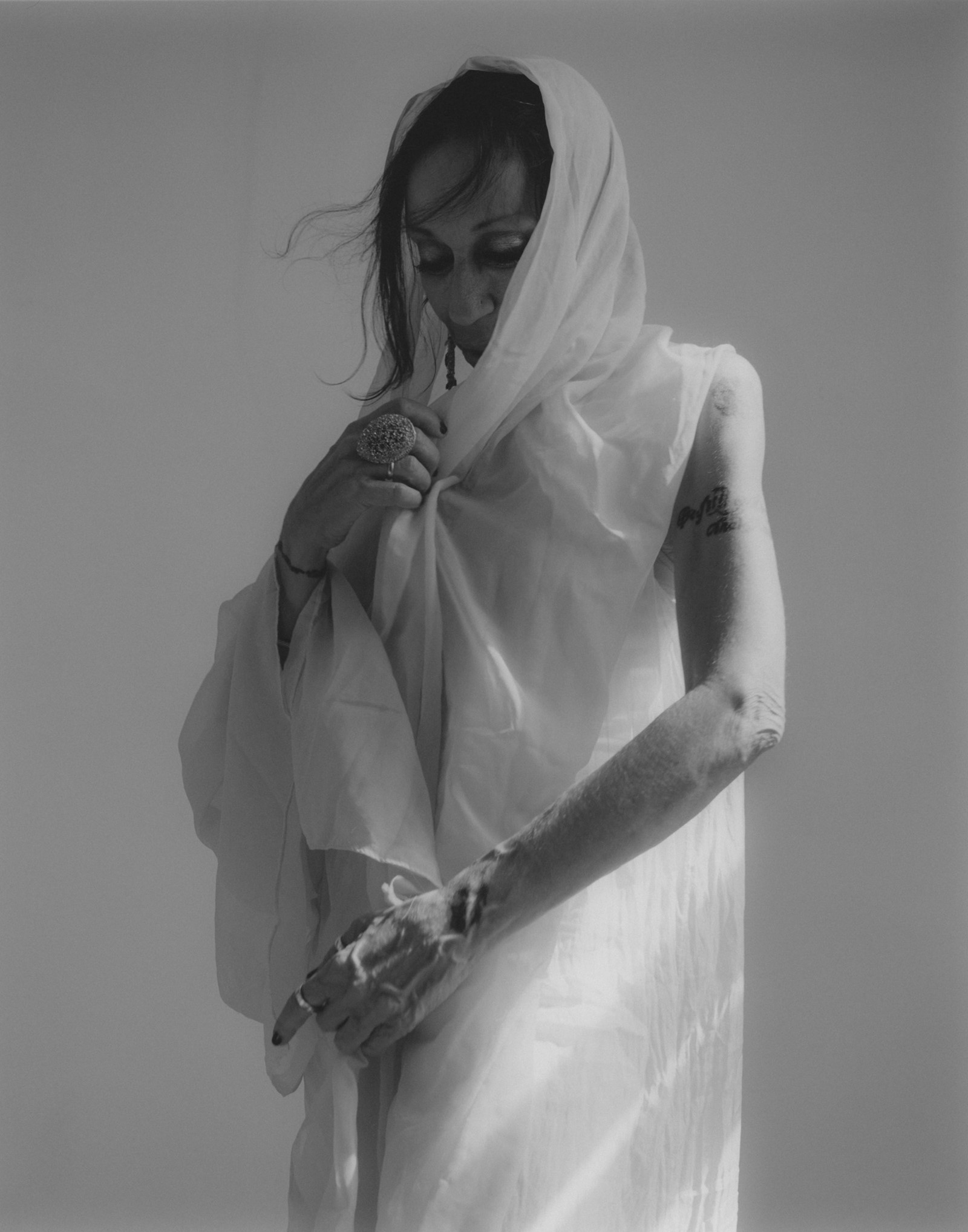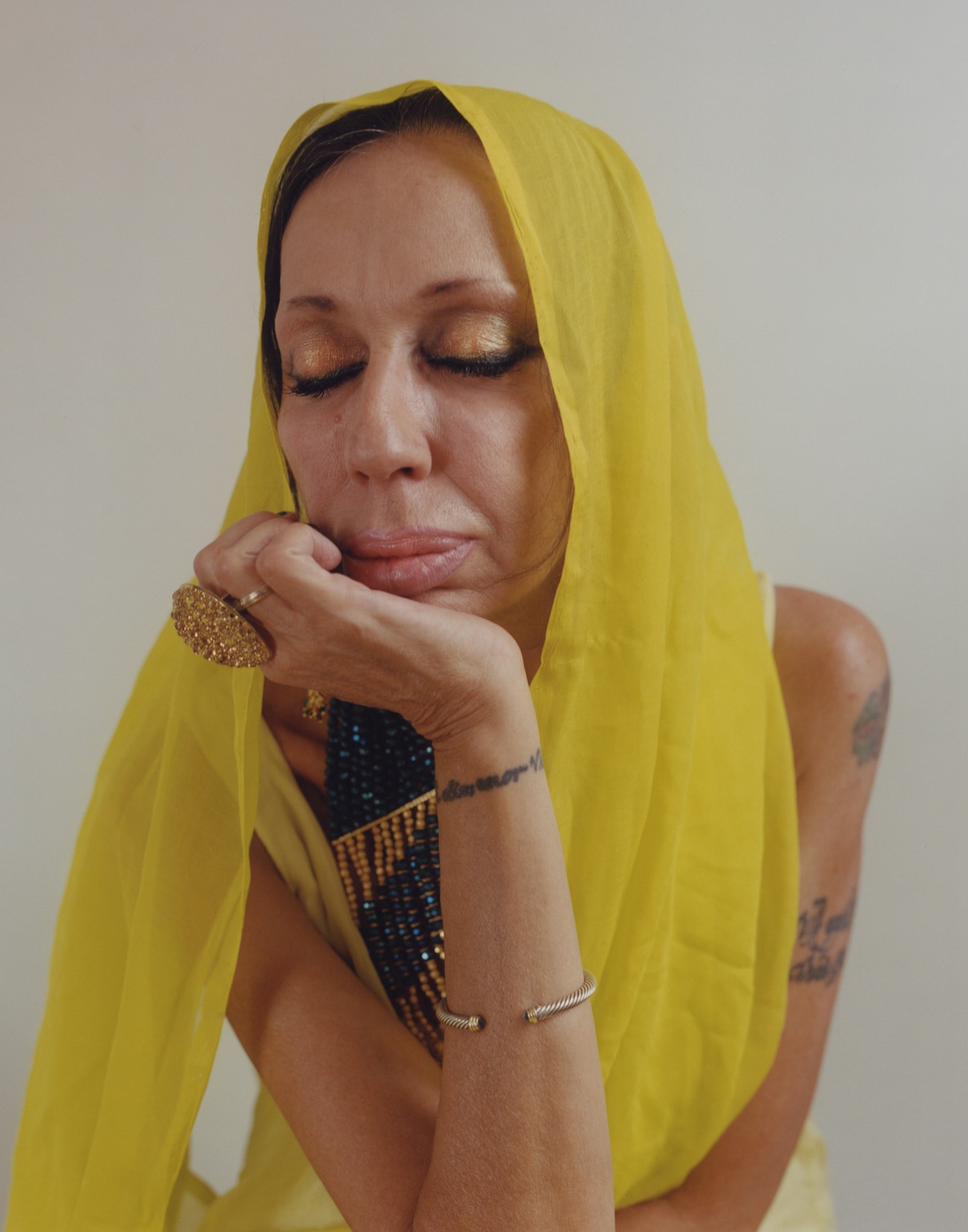Little Annie Bandez is a woman of ungraspable subcultural impact. Best known for her seductively abstract formulations of blues and jazz, her influence has an abundance of transgressive importance. As a teenager, she and her band Annie Anxiety and The Asexuals played regular gigs at iconic New York hotspot Max’s Kansas City; in the 1980s, she relocated to Dial House in Essex, the anarcho-punk palace of British collective Crass; and she has since collaborated with such radical musicians as Anhoni, Marc Almond, Lee ‘Scratch’ Perry, Coil or Lydia Lunch. In other words, to describe her as an avant-garde pioneer is an understatement.
Lately, she has also been focusing her attention on painting, the prestigious Gavin Brown Gallery in New York recently hosting a solo show of her work. When we meet in London, prior to her performance at Dalston's Cafe Oto, I am overwhelmed by her kindness. The name Little Annie is totally appropriate; she is small in stature, but radiates a uniquely generous warmth and eccentricity. Before the show, we decide to get our nails done, taking the chance to discuss her childhood and the most radical lessons she’s learnt, as well as her understanding of contemporary social inequality and making disco records with Crass.

Could you tell me about your upbringing?
My father was in the army during the second world war liberating Dachau, so growing up he refused to discuss race or nationality with us because his experiences meant that he didn’t believe in it. It was an amazing way to be brought up but I am just learning about my family history now. My grandmother was black and I recently did a DNA test and discovered that I am South American, Japanese and Middle Eastern!
"At school, I had a teacher who would constantly call me a communist – when I was 11 years old!"
Me and my sister were lucky in how our parents educated us. For example, our father also didn’t let us watch I Love Lucy, feminism wasn’t a topic in the same way that race wasn’t; we were brought up to believe that we could do anything regardless of words. In I Love Lucy the main character plays games with men and comes across as naive and silly. It's a stereotype that we were denied to spectate, and I am so grateful for that. We lived two miles away from Manhattan in Yonkers but it felt like planets away. I think my parents thought they were doing us a favour by bringing us there, but it was horrible so I got out of there as quick as I could get out. When I was at school, I had a teacher who would constantly call me a communist – when I was 11 years old!
And then you moved Downtown Manhattan?
As soon as I could, I think I was 14. I was living in the Chelsea Hotel when I was 16.

When I first listened to your music, I automatically respected it and I felt like I respected you as a person. There’s a confidence to your voice which is unusual and often undervalued in a female performer. Are you interested in inspiring other women with your work?
Absolutely, you know my friend took me to see Beyoncé the other month and I was so blown away her as a performer and her impact on the audience. To have that much of an audience and use it for good. When I saw the Formation video, I couldn’t believe it – finally somebody was doing something! When I first started playing music there were hardly any other women doing it. I’ve never thought about my gender but seeing Beyoncé, seeing the show, they were all women there and they were all dressed up for themselves; it was the stuff that I took for granted and it was the price for living my life, you know – I always just took being an authentic version of myself for granted.
"Beyoncé is actively creating a space where women of colour and women from working-class backgrounds can have discussions about feminism and if that isn’t progression, I don’t know what is!"
I was still living in New York when Eric Garner was murdered by the police. I remember when the verdict came out that they weren’t going to charge anyone. I never watch TV but it was the day the Christmas lights were going on and I thought, someone has to open their mouth over this injustice. I think Lady Gaga was doing [the lights], I mean this was live television and no one said anything! Nobody opened their fucking mouth. I was so angry. So when I saw the effect that Beyoncé had on her mainly female audience and the power of the Formation video, I realised that I really have waited my entire life for somebody like her! She's actively creating a space where women of colour and women from working-class backgrounds can have discussions about feminism and if that isn’t progression, I don’t know what is!
I was reading a book of essays by Dodie Bellamy this morning and she said something that really struck me; women compete over men because they don’t feel like they own anything. I find that the toxicity of female competitiveness still so potent but more importantly regressive...
Like bringing a piece of fresh meat back to the lair… It is unnatural for women to behave like this, it's diabolical; women really do own so little, we barely even own our own bodies. It is such a shame, I’ve worked with so few women in comparison to men in my lifetime. And that is just because there haven’t been as many women available to work with. There is this stereotype with women where we are made to feel like we’re 'getting our own way' rather than being on a plateau. Some of the biggest inspirations in my life have been the likes of Nina Simone, Shirley brown, Mavis Staples and Lily Algate, both for their music and their ideas. I mean ultimately I’ve never called myself feminist because I’m a humanist – well I’m not even a humanist, I’m everything-ist, you know what I mean?

One of my favourite records of yours is when you were under the name Annie Anxiety and you were living with Crass at Dial House in Essex. What was it like being there as a young woman from New York and making such progressive music?
It was exhilarating and it felt like a honest place to be. It aligned with everything I already knew I believed in. You know what? When me and Penny Rimbaud were making Barbed Wire Halo (1981), we thought that we were making a disco record! Honestly, I know it might not sound like that but we loved listening to disco together!
Who is one of your favourite radical voices?
Malcolm X – he touched me profoundly. I was five or six when he was assassinated but my mother gave me his autobiography when I was 12. I wish it was in every fucking school in the country.
"I wish Malcolm X's autobiography was in every fucking school in the country"
And what is the most radical thing you think you’ve experienced?
Oh, there are so many. I’ve had a couple of brushes with real danger. I’ve been in speeding car chases, I’ve found myself in the wrong place at the wrong time countless times. But you know what has been the actually most radical thing that I’ve learnt? In my old apartment in Manhattan, my neighbours who lived below us were constantly – and I mean constantly – complaining about noise, from the sound of my seven-pound Chihuahua Sparky walking! It was ridiculous; it went on for years and it turned into total drama. Every time they complained, I would send them a Christmas card and, you know, that didn’t work. I tried to speak to the building manager, that didn’t work either. I didn’t realise how destructive this domestic situation was becoming. And I realised it’s not my fucking problem. They wanted the problem, so one day I just decided to ignore it, I could finally see through all of the white noise and even though that might not seem radical – it was! Consciously not involving yourself in drama is probably one of the most radical things I have ever experienced.
